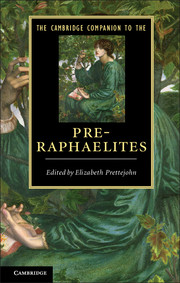Book contents
- Frontmatter
- Introduction
- PART ONE PRE-RAPHAELITISM
- PART TWO PRE-RAPHAELITES
- 6 The poetry of Dante Gabriel Rossetti (1828–1882)
- 7 The painting of Dante Gabriel Rossetti
- 8 William Holman Hunt (1827–1910)
- 9 John Everett Millais (1829–1896)
- 10 Ford Madox Brown (1821–1893)
- 11 Christina Rossetti (1830–1894)
- 12 Elizabeth Eleanor Siddall (1829–1862)
- 13 The writings of William Morris (1834–1896)
- 14 The designs of William Morris
- 15 Edward Burne-Jones (1833–1898)
- 16 Algernon Charles Swinburne (1837–1909)
- 17 William Michael Rossetti (1829–1919)
- 18 Envoi
- Appendix 1 The contents of The Germ
- Appendix 2 The Pre-Raphaelite ‘list of Immortals’
- Guide to further reading and looking
- Cambridge Companions to …
- Index
17 - William Michael Rossetti (1829–1919)
from PART TWO - PRE-RAPHAELITES
Published online by Cambridge University Press: 28 September 2012
- Frontmatter
- Introduction
- PART ONE PRE-RAPHAELITISM
- PART TWO PRE-RAPHAELITES
- 6 The poetry of Dante Gabriel Rossetti (1828–1882)
- 7 The painting of Dante Gabriel Rossetti
- 8 William Holman Hunt (1827–1910)
- 9 John Everett Millais (1829–1896)
- 10 Ford Madox Brown (1821–1893)
- 11 Christina Rossetti (1830–1894)
- 12 Elizabeth Eleanor Siddall (1829–1862)
- 13 The writings of William Morris (1834–1896)
- 14 The designs of William Morris
- 15 Edward Burne-Jones (1833–1898)
- 16 Algernon Charles Swinburne (1837–1909)
- 17 William Michael Rossetti (1829–1919)
- 18 Envoi
- Appendix 1 The contents of The Germ
- Appendix 2 The Pre-Raphaelite ‘list of Immortals’
- Guide to further reading and looking
- Cambridge Companions to …
- Index
Summary
William Michael Rossetti was twice a brother. As a Rossetti he was sibling to the more famous Dante Gabriel and Christina, not to mention the practically unknown but seriously clever Maria. As a PRB he was one of the magical number of seven men who formed the original Brotherhood in 1848. If William Michael Rossetti was not a professional artist, he was, nevertheless, crucial to the whole construction of the Pre-Raphaelite movement. He promoted it, activated it, understood it, explained it, contextualized and memorialized it in a whole range of editorial, journalistic, critical, entrepreneurial and biographical enterprises. William E. Fredeman, pioneer of modern Pre-Raphaelite studies, estimated that in contrast with all the more flamboyantly glamorous figures associated with the Brotherhood, William ‘was almost the only man of action, and without him there would have been no Brotherhood, no Germ, no P. R. B. Journal, and no movement to leave its mark on the history of English art’.
William Michael Rossetti invented his contemporary and our still enduring view of the PRB. He was its advocate, secretary and historian – and these functions made him a key player. Although he was a taxman by day, rising to senior ranks within the Inland Revenue, he was a critic of art and literature by night. Pre-Raphaelitism was above all a literary art movement, inspired by Dante, Chaucer, Shakespeare and the Romantic poets, and William's role put him at the crossover between image and words.
- Type
- Chapter
- Information
- The Cambridge Companion to the Pre-Raphaelites , pp. 250 - 264Publisher: Cambridge University PressPrint publication year: 2012



